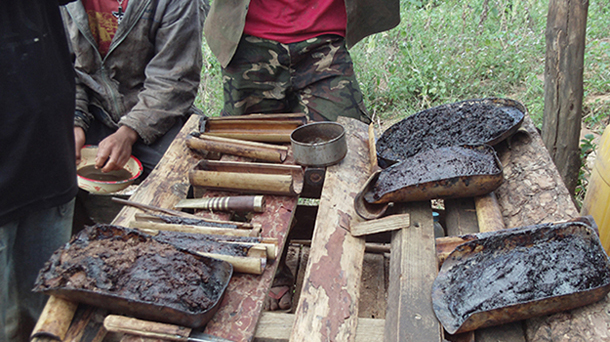PEKHON, Shan State—Amid abundant poppy plantations in this southern township of Shan State, local farmers find themselves in a dilemma: Almost every household here grows opium poppy, citing a lack of other options, but they aren’t pleased to be in the business.
“We aren’t happy growing this poppy, because we know that people will die from opium,” a grower from Laei village told The Irrawaddy recently. “But we’re starving, and nobody is helping us. Who cares about us?”
The annual poppy harvest ended last month in Pekhon Township, a Kayan ethnic minority area, and farmers noted a much smaller yield than normal, in part due to heavy rain and wind last year.
The government’s drug eradication campaign has also added to their difficulties, as anti-narcotics officials have tried to destroy poppy fields throughout Burma, the world’s second-largest opium producer.
Though Kayan farmers in Shan State support the goal of eliminating drug use, they say they haven’t been taught how to substitute their poppy fields with other crops.
And despite the anti-drug program, they say local authorities and armed groups in the area continue to promote poppy cultivation, often demanding a portion of their income from harvest yields.
“Every year, we produce hundreds of tons of opium here,” said Saw Lwin, joint secretary of the Kayan New Land Party. “The government’s anti-drug program destroys our harvests, but then the authorities say we shouldn’t worry, encouraging us to keep growing it.”
In addition to paying an annual tax of 20 million to 30 million kyat (US $23,000 to $35, 000) on their crops, farmers say they bribe local authorities to protect their fields from anti-drug officials, but at least one third of their crops were still destroyed last year.
In Pekhon Township, villages such as Kahant, Laei and Latein have tried to ban opium use by expelling residents caught with the drug. They also promote local sayings such as “Grow opium poppy, don’t use it,” and they post anti-drug notices at every village entrance.
But according to Lwi Si Nyein, a former political prisoner and a leader of the Kayan New Generation Youth group, drug use remains common, with overdoses leading to deaths in the township.
“We have a drug rehabilitation center in Pekhon, but the program stopped and we’re not sure why,” he said.
















